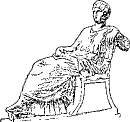LESSON II
FIRST PRINCIPLES (Continued)
23.
Inflection. Words may change their forms to indicate some change
in sense or use, as, is, are; was, were; who, whose, whom; farmer,
farmer’s; woman, women. This is called inflection. The
inflection of a noun, adjective, or pronoun is called its
declension, that of a verb its conjugation.
24.
Number. Latin, like English, has two numbers, singular and
plural. In English we usually form the plural by adding -s or
-es to the singular. So Latin changes the singular to the plural
by changing the ending of the word. Compare
| Naut-a pugnat The sailor fights |
Naut-ae pugnant The sailors fight |
25.
Rule. Nouns that end in -a in
the singular end in -ae in the plural.
26.
Learn the following nouns so that you can give the English for the Latin
or the Latin for the English. Write the plural of each.
|
agri´cola, farmer (agriculture)1 aqua, water (aquarium) causa, cause, reason
do´mina, lady of the house, mistress (dominate)
filia, daughter (filial)fortū´na, fortune |
fuga, flight (fugitive) iniū´ria, wrong, injury lūna, moon (lunar) nauta, sailor (nautical) puel´la, girl silva, forest (silvan) terra, land (terrace) |
1. The words in parentheses are English words related to the Latin. When
the words are practically identical, as causa, cause, no
comparison is needed.
27.
Compare again the sentences
|
Nauta pugna-t The sailor fights |
Nautae pugna-nt The sailors fight |
15
28.
Rule. Agreement of Verb. A
finite verb must always be in the same person and number as its
subject.
29.
Rule. In the conjugation of the
Latin verb the third person singular active ends in -t, the third
person plural in -nt. The endings which show the person and
number of the verb are called personal endings.
30.
Learn the following verbs and write the plural of each. The personal
pronouns he, she, it, etc., which are necessary in
the inflection of the English verb, are not needed in the Latin, because
the personal endings take their place. Of course, if the verb’s subject
is expressed we do not translate the personal ending by a pronoun; thus
nauta pugnat is translated the sailor fights, not the
sailor he fights.
| ama-t | he (she, it) | loves, is loving, does love (amity, amiable) |
| labō´ra-t | “ “ “ | labors, is laboring, does labor |
| nūntia-t2 | “ “ “ | announces, is announcing, does announce |
| porta-t | “ “ “ | carries, is carrying, does carry (porter) |
| pugna-t | “ “ “ | fights, is fighting, does fight (pugnacious) |
2. The u in nūntiō is long by exception. (Cf. § 12. 2.)
31.
EXERCISES
2. The sailor is carrying, the sailors carry.
3. The farmer does labor, the farmers labor.
4. The girl is announcing, the girls do announce.
5. The ladies are carrying, the lady carries.
II. 1. Nauta pugnat, nautae pugnant.
2. Puella amat, puellae amant.
3. Agricola portat, agricolae portant.
4. Fīlia labōrat, fīliae labōrant.
5. Nauta nūntiat, nautae nūntiant.
6. Dominae amant, domina amat.

DOMINA